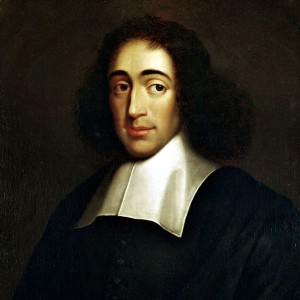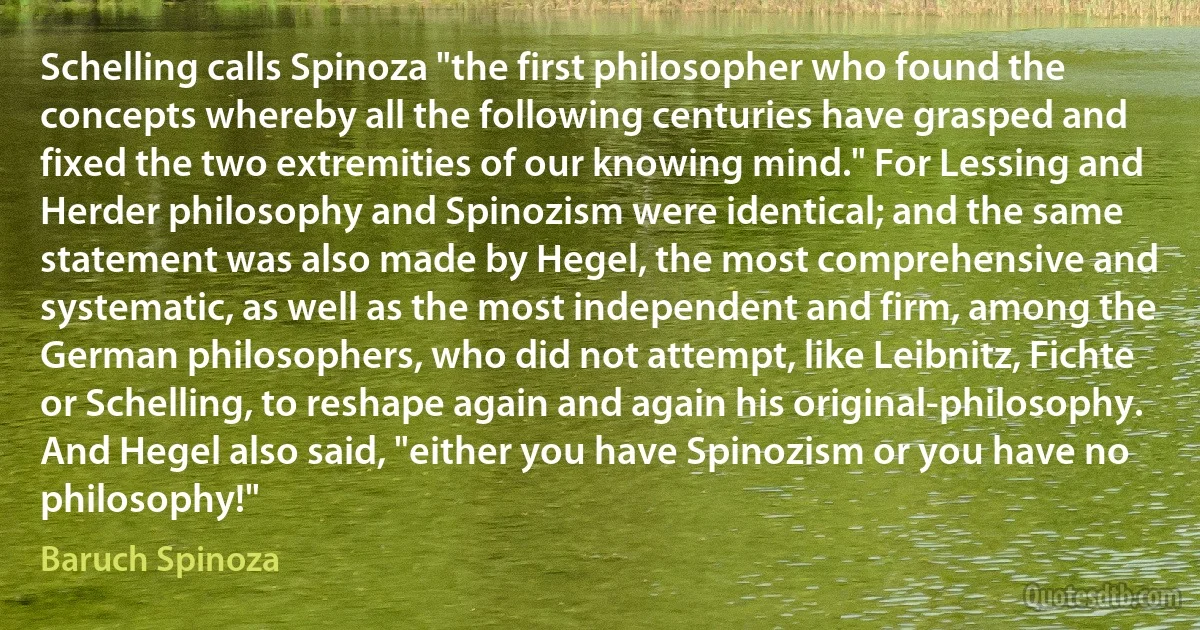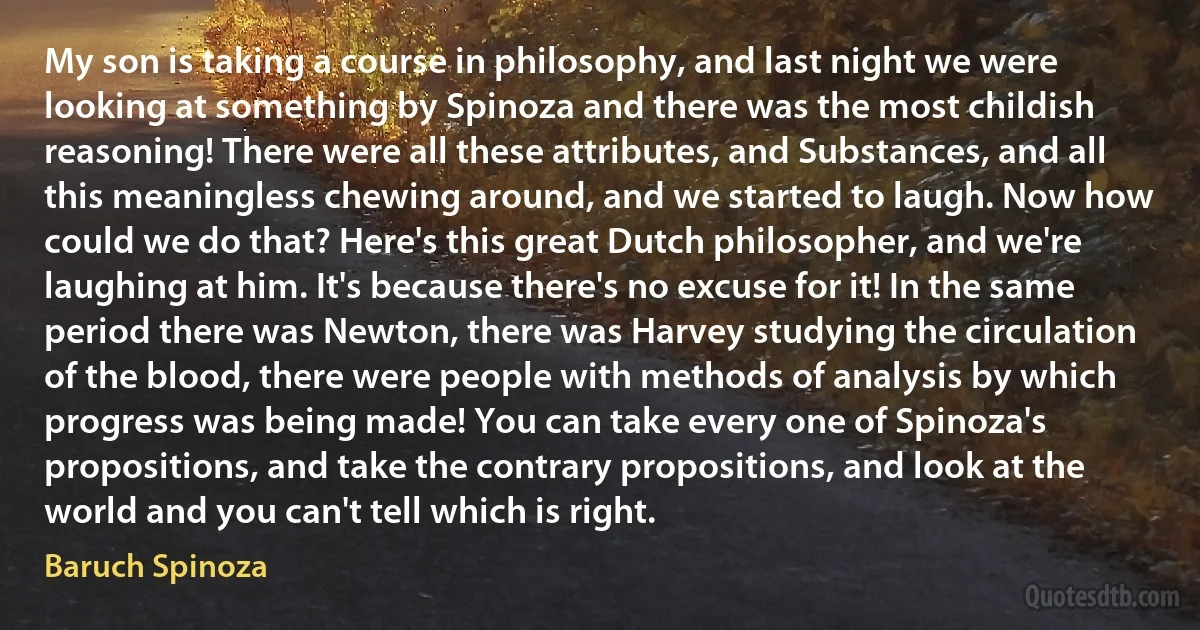Baruch Spinoza quotes - page 11
Baruch Spinoza was a Dutch-Jewish philosopher, renowned for his work in rationalism and ethics. His writings laid the foundation for the Enlightenment and modern biblical criticism. He challenged traditional views, advocating freedom of thought and a pantheistic understanding of God. Here are 338 of his quotes:
When reading the story of Yeshu one is reminded of another Jew who, like Yeshu, became one of the most influential people in all of history but was also condemned and rejected by the Jews – Baruch Spinoza of Amsterdam (1632-1677). He, too, had been fully part of the Jewish community, then started to oppose Judaism, broke away at a young age and became one of the greatest secular Jewish philosophers ever. He, too, is admired by millions.

Baruch Spinoza
Although Baruch Spinoza is one of the great thinkers of the European philosophical tradition, he was not a professional scholar – he earned his modest living as a lens grinder. So, unlike many thinkers of his time, he was unconstrained by allegiance to a church, university or royal court. He was free to be faithful to the pursuit of truth. This gives his philosophy a remarkable originality and intellectual purity – and it also led to controversy and charges of heresy. In the 19th century, and perhaps even more recently, "Spinozist" was still a term of abuse among intellectuals. In a sense, Spinoza was always an outsider – and this independence is precisely what enabled him to see through the confusions, prejudices and superstitions that prevailed in the 17th century, and to gain a fresh and radical perspective on various philosophical and religious issues.

Baruch Spinoza
Some of Spinoza's ideas are part and parcel of our culture, but to the best of my knowledge Spinoza is absent as a reference from the modern efforts to understand the biology of the mind. This absence is interesting in itself. Spinoza is a thinker far more famous than known. Sometimes Spinoza appears to rise out of nothing, in solitary and unexplained splendor, although the impression is false-in spite of his originality he is very much a part of his intellectual times. And he appears to dissolve as abruptly, without succession-another false impression given that the essence of some of his forbidden proposals can be found behind the Enlightenment and well beyond in the century that followed his death.

Baruch Spinoza
I shall not attempt to speculate as to what Spinoza might have been if he had lived in our time. For me, in any case, one thing is not open to doubt: Spinoza would never have been an agent of the League of Nations. The second point that I wish to emphasize is that we do not agree to yield Spinoza to our enemies in any case. There is no reason at all for this. Spinoza was a great materialistic thinker, and in this respect he should be considered a predecessor of dialectical materialism. The contemporary proletariat is Spinoza's only genuine heir.

Baruch Spinoza
His [Hegel's] early and decisive break with theism came in correspondence with Schelling and Hölderlin, who were reading Fichte's 1794 Wissenschaftslehre as Spinozism on a Kantian foundation. He later professes his own Spinozism in bold terms. "You are either a Spinozist or not a philosopher at all” and "It is therefore worthy of note that thought must begin by placing itself at the standpoint of Spinozism; to be a follower of Spinoza is the essential commencement of all Philosophy. For as we saw above, when man begins to philosophize, the soul must commence by bathing in this ether of the One Substance in which all that man has held as true has disappeared”.

Baruch Spinoza
...Those individuals to whom we owe the great creative achievements of science were all of them imbued with a truly religious conviction that this universe of ours is something perfect, and susceptible through the rational striving for knowledge. If this conviction had not been a strongly emotional one, and if those searching for knowledgehad not been inspired by Spinoza's amor dei intellectualis, they would hardly have been capable of that untiring devotion which alone enables man to attain his greatest achievements.

Baruch Spinoza
The only successful attempt to free human reason from the authority of religion was that of Spinoza (1632–1677). In his Theologico-Political Treatise (1670) he denied the claims for divine authority based on the text of Scripture and religious tradition. [...] Spinoza was the first secular Jew, and as such, the first secular man. Indeed, he served as the role model for all secular Jews, instituting the precise features that characterized future Jewish secularists.

Baruch Spinoza
If all that divides Marx from the Classical Economists amounts to the historical character of economic categories, Marx need only historicize these categories, refusing to take them as fixed, absolute or eternal, but, on the contrary, regarding them as relative, provisional and transitory, i.e., as categories subject in the last instance to the moment of their historical existence. In this case, Marx's relation to Smith and Ricardo can be represented as identical with Hegel's relation to classical philosophy. Marx would then be Ricardo set in motion, just as it is possible to describe Hegel as Spinoza set in motion; set in motion, i.e., historicized.

Baruch Spinoza
Spinoza formulated the problem of the socially patterned defect very clearly. He says: "Many people are seized by one and the same affect with great consistency. All his senses are so strongly affected by one object that he believes this object to be present even if it is not. If this happens while the person is awake, the person is believed to be insane. ... But if the greedy person thinks only of money and possessions, the ambitious one only of fame, one does not think of them as being insane, but only as annoying ; generally one has contempt for them. But factually greediness, ambition, and so forth are forms of insanity, although usually one does not think of them as 'illness.'" These words were written a few hundred years ago ; they still hold true, although the defects have been culturally patterned to such an extent now that they are not even generally thought any more to be annoying or contemptible.

Baruch Spinoza
...The proposal to think the determination of the elements of a whole by the structure of the whole posed an absolutely new problem in the most theoretically embarrassing circumstances, for there were no philosophical concepts available for its resolution. The only theoretician who had had the unprecedented daring to pose this problem and outline a first solution to it was Spinoza. But, as we know, history had buried him in impenetrable darkness. Only through Marx, who, however, had little knowledge of him, do we even begin to guess at the features of that trampled face.

Baruch Spinoza
...But I was indeed on Spinoza's "line" by insisting with Marx and Hegel on the distinction between the "real concrete," therefore, the universal singular (all the "cases" that constitute the world from the beginning of knowledge of the first kind), and the concrete-in-thought that constitutes knowledge of the third kind.

Baruch Spinoza
Hegel is (unknowingly) an admirable 'theoretician' of ideology insofar as he is a 'theoretician' of Universal Recognition who unfortunately ends up in the ideology of Absolute Knowledge. Feuerbach is an astonishing 'theoretician' of the mirror connexion, who unfortunately ends up in the ideology of the Human Essence. To find the material with which to construct a theory of the guarantee, we must turn to Spinoza.

Baruch Spinoza
The great Voltaire once accused Spinoza of ‘abusing metaphysics'. Is not the uncompromising nature of metaphysics more important today than ever? Has not liberated thinking become the most valued freedom at a time when political systems, social constraints, moral codes and political correctness often control our thinking?

Baruch Spinoza
...We know at least since Spinoza that joy and its variant lead to a greater functional perfection, and that sorrow and related effects are unhealthy and should therefore be avoided. But music allows us to feel pain and pleasure simultaneously, both as players, and as listeners. [...] Music to me is sound with thought, and as Spinoza believed that rationality was the saving grace of the human being, then we must learn to look at music like this too.

Baruch Spinoza
One of Spinoza's most important conclusions is that of the human being's necessity to overcome the contradiction between the finite and the infinite. Spinoza was able to express the very nature of the Judaeo-Christian way of thought and, at the same time, to remain outside it and even negate it. Both in the Jewish and the Christian traditions, God creates the world but is outside it. Spinoza, on the other hand, would not say that God creates the world, but that He produces it – in philosophical terms, He causes it. God, for Spinoza, is not outside the world and this view was the object of very harsh criticism by his contemporaries. The Jewish community in Holland even saw fit to excommunicate him. The God of Judeao-Christian thought, according to Spinoza, is an invention of man, who imagines that God thinks and acts as human beings do.

Baruch Spinoza
...Spinoza was the philosopher who knew full well that immanence was only immanent to itself and therefore that it was a plane traversed by movements of the infinite, filled with intensive ordinates. He is therefore the prince of philosophers. Perhaps he is the only philosopher never to have compromised with transcendence and to have hunted it down everywhere. In the last book of the Ethics he produced the movement of the infinite and gave infinite speeds to thought in the third kind of knowledge. There he attains incredible speeds, with such lightning compressions that one can only speak of music, of tornadoes, of wind and strings. He discovered that freedom exists only within immanence. He fulfilled philosophy because he satisfied its prephilosophical presupposition. [...] Spinoza is the vertigo of immanence from which so many philosophers try in vain to escape. Will we ever be mature enough for a Spinozist inspiration?

Baruch Spinoza
I love our old Chuang-tzu
because I love his pantheism,
because he got a living by making straw shoes.
I love the Dutchman Spinoza
because I love his pantheism,
because he got a living by grinding lenses.
I love the Indian Kabir
because I love his pantheism,
because he got a living by knotting fishing-nets.

Baruch Spinoza
Baruch Spinoza
 Occupation: Dutch Philosopher
Occupation: Dutch Philosopher
Born: November 24, 1632
Died: February 21, 1677
Quotes count: 338
Wikipedia: Baruch Spinoza


![[Alberto Knox] Spinoza belonged to the Jewish community of Amsterdam, but he was excommunicated for heresy. Few philosophers in more recent times have been so blasphemed and so persecuted for their ideas as this man. It happened because he criticized the established religion. He believed that Christianity and Judaism were only kept alive by rigid dogma and outer ritual. He was the first to apply what we call a historico-critical interpretation of the Bible. (Baruch Spinoza)](https://cdn.quotesdtb.com/img/quotes_images_webp/93/baruch-spinoza-bible-call-1015193.webp)











